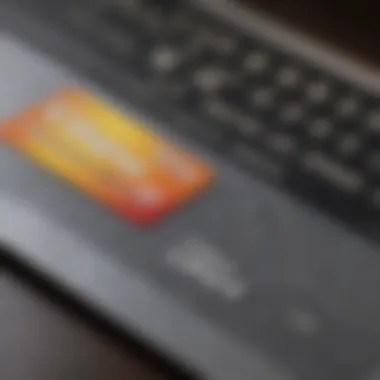Challenging Credit Card Charges After Six Months


Intro
When it comes to managing personal finances, few issues evoke as much angst as dealing with disputed charges on credit card statements. The timeline for resolving such disputes is often straightforward, yet what happens when the clock ticks past the typical six-month mark? Is it a lost cause or still worth pursuing? As young professionals, students, and small business owners navigate the terrain of credit card usage, understanding their rights and the processes available empowers them to tackle such challenges with confidence. This article will break down the intricacies surrounding credit card charge disputes, particularly those that surface beyond the standard six-month frame, so that you can approach each situation well-informed.
Understanding Financial Literacy
Definition and Importance
Financial literacy isn't just about knowing how to crunch numbers or navigate spreadsheets; it's the ability to understand and manage financial resources effectively. This encompasses knowledge of budgeting, savings, loans, and the ever-evolving landscape of credit. A financially literate individual is equipped to make informed decisions and is less vulnerable to risks—such as falling prey to the complications surrounding credit card charge disputes.
Basics of Financial Literacy
To establish a foundational understanding of financial literacy, one must delve into its core components:
- Understanding of Credit: Knowing how credit scores work, what affects them, and how they can impact loan applications helps navigate credit card usage effectively.
- Budgeting Skills: Creating and sticking to a budget can prevent overspending, thus reducing the chances of encountering hefty charges that may come under dispute later.
- Awareness of Rights: Being aware of consumer protection laws and policies is crucial when it comes to challenging any questionable charges.
Without these skills, individuals may find themselves floundering in a sea of financial uncertainty, making it critical to focus on continuous improvement in financial literacy.
Importance of Budgeting
Overview of Budgeting
Budgeting serves as the backbone of financial literacy. It involves tracking income and expenses to help create a clear picture of one’s financial health. When individuals understand where their money flows, they can proactively manage their resources, minimizing the likelihood of unexpected charges that pop up on credit card statements.
Benefits of Having a Budget
The advantages of maintaining a budget are manifold:
- Prevention of Debt Accumulation: A sound budget can avert unnecessary debt from accruing, making disputes less likely down the line.
- Enhanced Savings: By allocating funds towards savings, one can build a financial cushion, ready to absorb any disputes or emergencies that may arise.
- Improved Financial Decision-Making: A detailed breakdown of financial inflow and outflow enhances overall decision-making, which is essential when considering products or services associated with credit cards.
Staying organized and in control allows you to approach any dispute not as a daunting task but as a manageable component of your financial journey.
"Knowledge is power, especially when it comes to navigating the complexities of personal finance and credit card disputes."
Understanding the Basics of Credit Card Disputes
When it comes to handling credit card transactions, a clear grasp of the basics surrounding disputes is crucial. Knowing the ins and outs can save one from a world of financial hurt. This section lays the foundation for understanding why disputes arise and how they can be effectively managed. It's about equipping yourself with the information necessary to reclaim control over your finances.
Definition of Credit Card Charge Disputes
A credit card charge dispute occurs when a cardholder contests a transaction on their statement. This can arise from various situations, ranging from unauthorized use of the card to receiving faulty merchandise. Essentially, it's your card issuer stepping into the fray on your behalf, which often leads to a thorough investigation into the transaction in question.
Reasons for Disputing a Charge
Disputes might not have the same allure as a shiny new credit card, yet understanding the reasons behind them is essential. Here are some common culprits:
- Fraudulent charges: This is the big one. When a transaction appears on your account that you didn’t authorize, it can wreak havoc. The key characteristic of fraudulent charges lies in their potential to come from identity theft or credit card scams. They are prominent in discussions about consumer protection, making it imperative for individuals to promptly identify and address these issues. The upside? Reporting them can lead to investigations that may end in the restoration of funds. However, it’s important to act quickly; delays can complicate matters.
- Goods not received: Have you ever paid for something and then watched as the days turned into weeks without the item arriving? This scenario is more common than you might think. The inability to receive the goods often warrants a dispute as it highlights a retailer's failure to meet their obligations. This aspect emphasizes the importance of consumer rights—ensuring you get what you pay for. While the process can lead to successful resolution, there's always the chance that the retailer might dispute your claim, adding layers of complexity.
- Damage or misrepresentation: Picture this: you order a sleek gadget online, but when it arrives, it’s nothing like what was advertised. Whether it’s a defect or a product not matching its description, these situations are valid grounds for disputing a charge. This reflects a fundamental breach of trust. While it can be a hassle to initiate a dispute in such cases, it also serves as a reminder of consumer rights in the market. Remember, backing claims with proper evidence can go a long way in influencing the outcome in your favor.
Time Frames for Dispute Submission
Understanding the timelines for dispute submission is another piece of the puzzle. Knowing how long one has to contest charges can significantly impact the outcome.
- Standard dispute timelines: Generally, most credit card providers give cardholders a window of about 60 to 120 days to dispute a charge, but some organizations might claim you have even longer. The standard timeline is vital because it sets the stage for swift action. The earlier you lodge a dispute, the better the chances of a favorable resolution. That said, some card issuers could respond faster or slower, which can lead to some confusion.
- Variability based on card issuer: Here’s where things can go haywire. Each card issuer may have different policies that could influence dispute processes. For instance, one bank might stick closely to the standard timelines, while another might give consumers additional time under specific conditions. It’s essential for cardholders to familiarize themselves with their issuer’s rules. This variability can either provide a safety net for consumers or complicate matters, depending on how your issuer handles disputes.
By unraveling the basics of charge disputes, individuals can be better prepared. Knowing the reasons for disputes, timelines for lodging them, and what constitutes a valid reason strengthens one's position and enhances overall financial confidence. With a clear roadmap, navigating the often turbulent waters of credit card charges becomes much easier.
Legal Framework Governing Credit Card Disputes
Understanding the legal framework surrounding credit card disputes is crucial when addressing issues with an authorized charge, especially one made beyond the typical six-month timeframe. It provides a structure that defines your rights and the obligations of card issuers, guiding individuals as they navigate the complexities of financial transactions. This section delves into the Fair Credit Billing Act and consumer rights under federal law, highlighting how these regulations empower consumers and potentially impact dispute outcomes.


Fair Credit Billing Act Overview
The Fair Credit Billing Act (FCBA) is essential legislation for anyone dealing with credit card disputes. Enacted in 1974, this act lays down protections for consumers against unfair billing practices by credit card companies. One of the core principles of the FCBA is to provide consumers a clear and defined process for disputing charges.
Under the FCBA, you have the right to challenge charges if they are not correct. This could include situations like receiving subpar goods or encountering fraudulent transactions. Importantly, consumers are generally protected from being liable for disputed amounts while an investigation is underway.
Additionally, the FCBA mandates that card issuers must respond to disputes promptly, typically within thirty days, and resolve them within two billing cycles. However, this act does not provide clear guidance about disputes filed after six months, which is where nuances and issuer policies might play a role.
Consumer Rights Under Federal Law
Consumers possess several rights under federal law concerning financial transactions, particularly through credit card use. These rights extend beyond the FCBA and include protections against discrimination, fraud, and deceptive practices.
- Right to Dispute: As already mentioned, you have the right to dispute any unauthorized transaction. This right protects you from liability for unauthorized charges.
- Disclosure Requirements: Creditors are required to provide clear, concise disclosure regarding terms and fees associated with credit products. This is crucial to ensure that you know what you’re signing up for.
- Right to Privacy: You are entitled to privacy regarding your financial data. This includes how your information is shared or used by creditors or other third parties.
- Credit Reporting Accuracy: Under the Fair Credit Reporting Act, you have the right to dispute inaccuracies in your credit report, which can help you maintain a healthy credit score.
Understanding these rights equips consumers to navigate financial disputes confidently. Should you find yourself dealing with a charge dispute after the standard six-month period, being informed about your rights can make your case stronger and help you address the situation more effectively.
Disputing Charges Beyond Six Months: Is It Feasible?
When you find yourself on the wrong end of a credit card charge after six months, the question looms large: Can you still challenge that charge? This is more than just a legal inquiry; it's about understanding your rights as a consumer and navigating the complex web of financial regulations.
The importance of challenging a charge that stretches beyond the typical timeframe cannot be understated. Life is unpredictable, and various factors can lead to situations where disputes are delayed. Whether it's poor communication with the merchant or personal circumstances that divert your attention, knowing your options helps you make informed choices. Being prepared for potential setbacks in your disputes may save you a ton of hassle down the road.
Card Issuer Policies
Each credit card issuer has its own set of policies regarding disputes, and these can vary widely. It’s crucial to familiarize yourself with these guidelines since they determine how your late dispute will be handled.
- Time Constraints: Certain issuers might offer leniency beyond the standard six-month window, while others are strict and will flat-out deny the opportunity to dispute late charges. Knowing their stance is like having a map in uncharted territory.
- Types of Available Support: Some issuers might allow alternative routes for dispute resolution, such as mediation or appeals. Therefore, it's wise to read the fine print or even give them a call. Always have your documentation ready.
Possible Outcomes of Late Disputes
Challenging a charge after six months can lead to various outcomes, and both sides of this debate need to be weighed carefully.
Partial refunds
A partial refund is often a scenario for late disputes. This means that while not every dollar can be reclaimed, the financial institution may grant you back a portion of the money. This can provide immediate relief, especially if the charge was significantly inflated or unjustified.
- Key Characteristic: Partial refunds can come with less red tape than full reversals since it often aligns with the issuer’s risk management policies.
- Advantages: This option allows some financial respite without turning into a full-blown dispute. A partial refund can serve to placate both the consumer and the merchant.
However, the downside is that consumers might feel short-changed if they believe they deserve a full refund. This can lead to frustration or a feeling of injustice, which can affect future engagement with the credit issuer.
Declined disputes
On the flip side, a declined dispute is a reality many face when pushing back against a charge past the six-month threshold. Simply put, when you attempt to challenge a charge and the issuer says, "Nope, not gonna happen," it can feel pretty disheartening.
- Key Characteristic: They often arise when an issuer adheres closely to their policies. If your dispute falls outside their guidelines, they might not even entertain it.
- Advantages: While it’s disheartening, a decline can also have its benefits. It allows the card issuer to stick to their risk-averse business model. Additionally, knowing that you’ve reached the end of the line can enable you to shift gears toward other financial recovery tactics.
The unique feature of declined disputes, however, is the finality it imposes. Accepting a declined dispute often means letting go of a potential refund, and it may even solidify a lack of trust in your financial institution moving forward.
Ultimately, understanding the nuances of partial refunds and declined disputes gives you a better chance to navigate this complex landscape and make effective decisions regarding your financial future.
In sum, tackling a charge after the six-month grace period is not only feasible in some cases but can also yield varying outcomes depending on how you go about it. Having a keen awareness of card issuer policies and being prepared for potential results might just make the difference between a successful challenge and a wasted effort.
Strategies for Challenging Old Charges
When it comes to navigating the sometimes murky waters of credit card disputes, knowing how to effectively challenge old charges is crucial. This section focuses on actionable strategies that empower consumers who may find themselves in the unfortunate position of needing to dispute a transaction well beyond the typical window for doing so. Understanding these strategies can provide clarity and structure to an often confusing process, ensuring that individuals are prepared to tackle their financial concerns with confidence.
Gathering Evidence
Documentation requirements


Having the right documentation is like having a solid foundation when building a house – it’s essential. Documentation requirements encompass everything from receipts to transaction records that can substantiate your claim. Gathering such documents ensures you provide your issuer with clear evidence supporting your dispute. For instance, if you ordered a product online and it hasn’t arrived, a fact-based representation of all your interactions with the merchant—like emails or tracking numbers—will be highly beneficial.
The key characteristic of documentation is that it establishes an authentic narrative around the charge in question, which can help clarify any misunderstandings during the dispute process. However, one unique feature of documentation requirements is that variability exists based on what the credit card issuer considers valid evidence. This means that not every piece of paper will meet the criteria set by different issuers. Failing to provide the right type of documentation could significantly damage your chances of a successful challenge.
Importance of communication records
Communication records play a pivotal role in the dispute process. This includes notes from any phone calls you’ve made or correspondence through email. Keeping thorough records of every communication with your credit card company or merchant can serve as a crucial piece of evidence later on. The fundamental benefit here lies in the clarity these records provide. They can demonstrate both the timeline and content of your interactions, which can be critical in highlighting any delays or dismissals by the credit card issuer.
The unique feature of maintaining communication records is that they add a layer of transparency throughout the process. Particularly if you feel your initial concerns were met with indifference, having documented records can lend credence to your claims and help show a pattern of unresolved issues. That said, keeping all this organized can be challenging, so you’ll want to create a system that allows you to easily retrieve these records when needed.
Engaging with Your Credit Card Issuer
Requesting a formal investigation
Requesting a formal investigation is one of the most critical steps in addressing a disputed charge. When you formally initiate this process, what you're essentially doing is signaling to your issuer that there's a legitimate concern that warrants attention. This can set into motion a series of investigative measures on their part to review your claims thoroughly.
The key advantage of this step is that it provides a structured framework for your dispute. The investigation may yield information that is pertinent to your case, leading to a better understanding of the situation at hand. However, it’s essential to note that some issuers may have extended timelines for resolving formal investigations. This uncertainty can lead to frustration, but staying persistent is vital throughout the process.
Understanding issuer procedures
Understanding the specific procedures in place at your credit card issuer is another valuable strategy when tackling disputes. Each issuer has its own set of guidelines that dictate how disputes are handled. Familiarizing yourself with these procedures can help demystify the process and lead to a quicker resolution.
The fundamental characteristic of knowing your issuer's procedures is that it allows for more effective communication. For example, if you know the steps they typically follow, you can better anticipate potential delays or complications. One unique aspect of understanding these procedures is that it equips you with the knowledge needed to push for a timely response if things seem too quiet. In certain instances, your awareness can also empower you to escalate issues more effectively, should the original path not yield satisfactory results.
Escalating the Issue
Reporting to regulatory agencies
If all else fails, reporting your issue to regulatory agencies can further increase the chances of a satisfactory resolution. Organizations such as the Consumer Financial Protection Bureau (CFPB) exist to help consumers like you navigate disputes effectively. Reporting to these agencies can amplify your situation, placing additional pressure on your issuer to address your concerns seriously.
The essential feature of using regulatory agencies is that they often serve as a mediator when direct communication with your credit card company stalls. This can lead you to a resolution that was previously out of reach. However, the unique drawback here is that filing formal complaints can sometimes take time before yielding results. Patience is necessary, but the push from regulatory bodies can lead to significant outcomes.
Seeking legal counsel
Lastly, seeking legal counsel should not be overlooked, especially for more complex disputes. Having a legal expert can offer you guidance tailored to your specific situation, ensuring that you're equipped with all the correct language and nuances in your communications. This can make a tremendous difference in how your dispute is perceived and addressed.
The key benefit of consulting a lawyer is that they can navigate the intricacies of both contractual obligations and consumer rights under federal law. Their insight can illuminate options you may not have considered. However, it’s worth mentioning that legal expertise often comes at a cost, and depending on the complexity of your case, the expenses could stack up. Therefore, weighing potential benefits against your financial situation is critical before moving down this route.
Impact of Late Disputes on Credit Histories
Understanding the impact of late disputes on credit histories is crucial for anyone navigating through the maze of credit card charge challenges. A lapse in the timeline for disputing a charge can result in various ramifications that affect both your financial standing and future opportunities. Since your credit history often acts as a window into your financial behavior, how you handle disputes may follow you for years, impressioning lenders and affecting eligibility for loans and credit. In essence, timely dispute management is not merely a procedural aspect; it is a critical factor in maintaining a robust credit profile.
Credit Reporting Agencies: An Overview
Credit reporting agencies, such as Experian, TransUnion, and Equifax, serve as gatekeepers of your credit history. They aggregate information from various financial institutions about your borrowing habits, payment behavior, and even public records. When you dispute a charge, these agencies become key players because they are responsible for reporting accurate data. If a dispute is unresolved or mishandled, it may result in erroneous information on your report.
It's important to understand that these agencies do not decide whether a dispute is valid; they merely report on the data provided to them by creditors and consumers. Therefore, maintaining an open line of communication with your issuer is essential, as they inform the agencies of the outcome of any disputes.
How Disputes Affect Credit Scores
Navigating a dispute has immediate and long-term effects on your credit score, both of which warrant careful consideration.
Immediate impacts
When you file a dispute, the immediate effect can be multifaceted. First and foremost, if the dispute results in a temporary suspension of payments or a delayed acknowledgment of a charge, this can lead to derailing your payment history, which is a significant contributor to your overall credit score. A missed payment or one reported as late can knock several points off your score right fast.
This initial impression is crucial; your credit score is often your golden ticket to favorable loan terms or even rental agreements. While you might feel you're in the right, the credit scoring algorithms do not distinguish between disputers and non-disputers.
Long-term considerations


On the other hand, the long-term picture of disputes can be somewhat different. Once the dust settles, and if a charge is found to be invalid, it can restore some positivity to your credit profile. However, the mere act of disputing—even if ultimately successful—can linger in your history. Extended inquiries into your credit can also accumulate, which the scoring models may view unfavorably.
What’s more, some issuers might report disputes in a manner that complicates your future dealings. Even if the dispute is resolved, it remains vital to monitor any subsequent changes to your report, ensuring outdated or incorrect information is promptly corrected. This creates a cyclical necessity for vigilance in order to fortify one’s credit standing over time.
In summary, how you handle disputes can have both immediate and long-term implications on your credit score. Ensuring credibility in your actions can ultimately provide a more favorable financial standing.
Understanding the nuances of these impacts can empower young professionals, students, and small business owners to navigate their financial landscapes effectively. A proactive approach, coupled with sound knowledge of credit dynamics, can mitigate risks and maximize benefits in managing credit disputes.
Preventive Measures for Future Transactions
Navigating disputes over credit card charges can be a tricky endeavor, especially when dealing with a request that's stretched beyond the typical six-month window. However, taking preventive measures is essential. These steps not only reduce the likelihood of future disputes but also enhance financial savvy.
Best Practices for Tracking Charges
Regular account monitoring
Keeping a keen eye on regular account activity is a cornerstone of sound financial management. Regular checks can highlight issues like unauthorized charges or billing errors before they escalate into disputes. Staying ahead of any discrepancies is akin to catching a fish before it slips away—early intervention makes all the difference.
A key characteristic of regular monitoring is a proactive approach; it enables you to notice patterns or anomalies that might otherwise go unnoticed. This attentiveness is particularly useful in spotting recurring charges that could be clues to fraudulent activity or in confirming that subscription services are functioning as intended.
One unique feature of regular account monitoring is that it can often be done easily using a mobile app provided by your bank or credit card issuer. These apps often provide real-time notifications for transactions, which is handy but can have its downsides. For instance, constant alerts might lead to alert fatigue, whereby you start paying less attention to notifications if they become too frequent.
Utilizing budgeting tools
Using budgeting tools serves another layer of protection in managing finances. These digital companions can assist in setting limits, tracking spending, and even organizing receipts. When you allocate your money knowingly, you’re fostering responsible credit card use, reducing the chances of falling into debt traps.
A noteworthy characteristic of budgeting tools is their ability to create visual representations of your spending habits, such as pie charts and graphs. These can be incredibly helpful for visual learners, as they make it easy to see where the money goes each month. These features often lead individuals to create more intentional spending habits.
However, the unique feature of budgeting tools can also serve as a double-edged sword. Many tools require manual input of expenses, which can be tedious. Some may not integrate seamlessly with all credit card transactions, leading to gaps in tracking.
Understanding Merchant Policies
Return and refund policies
Every savvy shopper should grasp the return and refund policies of merchants before making a purchase. These policies dictate how easily you can return items and get your money back if something isn’t right. Knowing them can save you from potential heartaches down the line.
A significant aspect of return and refund policies is that they often vary from one retailer to another. Some places offer no-questions-asked returns while others might impose stringent deadlines. Being aware of these guidelines is crucial because it sets the foundation for expectations. A solid refund policy can be a buyer's best friend; it means your rights are protected.
Certain unique features of some merchants' policies might include extended return periods during holiday seasons or special promotions. However, some may also add restocking fees that can take a bite out of what you thought you’d be getting back, complicating the refund process.
Communication before purchase
Communication before making a buy is often underrated. Asking questions can help clarify doubts you have about a product or service, potential charges, or services included. Good communication with the merchant can preempt issues from arising; it’s sometimes just as essential as reading the fine print.
A key element of effective communication is that it fosters trust and transparency between you and the seller. When you ask questions—about delivery methods, fees, or product conditions—you’re engaging in a proactive approach that many customers overlook.
While this can lead to greater understanding, there’s the occasional downside: not every retailer is responsive or forthcoming. Some may provide vague answers, leading you back to square one. Moreover, if you miss relevant questions during your conversation, you may end up with unexpected surprises later.
Being aware of the landscapes of your financial interactions can lay the groundwork for future security, and can turn potential disputes into non-issues.
The End
Navigating the realm of credit card disputes, particularly challenging a charge after the standard six-month window, requires a firm grasp of both legal and procedural aspects. In this article, we explored the nuanced rights and options available to consumers. Understanding these can significantly impact not just the ability to reclaim funds but also one’s overall financial well-being.
This topic is important because it sheds light on the often-overlooked complexities involved in credit card disputes. Many assume that once the six-month mark passes, the door is permanently closed. However, as we've discussed, various mechanisms exist that may allow disputes beyond the timeframe initially thought to be a limit. Recognizing these opportunities can place consumers in a powerful position, equipping them with knowledge that can be instrumental in accepting or challenging certain charges.
Moreover, engaging with your credit card issuer effectively can pave the way for better outcomes, be it a complete reversal of the charge or partial compensation. It's crucial for individuals to understand that asserting their rights is a key component of consumer protection, reinforcing the importance of vigilance in financial transactions.
Summarizing Key Takeaways
- Time Limits Are Fluid: The six-month guideline is not an absolute limit. Depending on the situation and the card issuer's policies, there might still be routes to consider for challenging disputes.
- Importance of Documentation: Gathering thorough evidence is essential when disputing a charge, with records of all communications playing a pivotal role.
- Know Your Rights: Understanding the Fair Credit Billing Act and other consumer protections can significantly bolster your position when faced with erroneous charges.
- Communication is Key: Clear and persistent communication with credit card issuers increases the likelihood of favorable outcomes.
Future Considerations for Credit Card Users
As we move forward, keeping a keen eye on transactions and understanding merchant policies is vital. Here are some points for future consideration:
- Continuous Monitoring: Regularly reviewing account statements can help you catch and address any discrepancies sooner rather than later.
- Educate Yourself on Rights: Familiarize yourself with your rights as a consumer, particularly regarding the Fair Credit Billing Act, to better navigate any potential disputes.
- Leverage Technology: Utilize budgeting and tracking tools to manage your finances actively, which can assist in identifying issues before they escalate into disputes.
- Be Informed About Merchant Policies: Knowing the return and refund policies of merchants can help avoid unwanted charges in the first place.
Staying sharply informed and proactive about credit transactions can minimize future disputes and enhance overall financial stability. Taking these steps today not only safeguards your current financial interests but also lays the groundwork for sound financial management in the future.



